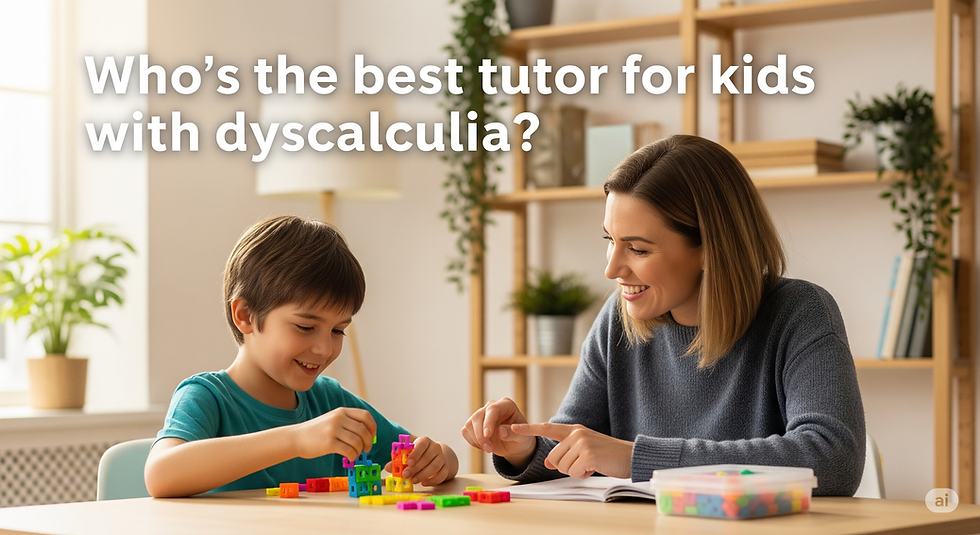Why Affordable Dyscalculia Tutoring May Be the Most Expensive Mistake You Make
- Susan Ardila

- Aug 6, 2025
- 5 min read

The Hidden Costs of Cheap Tutoring for Students with Dyscalculia
What You’re Saving in Dollars Might Be Costing Your Child Progress, Confidence, and Long-Term Success
It Seemed Like a Good Deal… Until It Wasn't
You found someone on Wyzant. Maybe it was a well-meaning college student, a retired teacher, or a general math tutor who said they’ve worked with "struggling learners" before. The price? A steal at $40 an hour. And at first, it felt like a win.
Until your child started dreading sessions. Progress stalled. Homework battles stayed the same (or got worse). And the emotional meltdowns? Still a regular part of your evenings.
Sound familiar? You’re not alone. Many families try what seems like affordable dyscalculia tutoring—only to find themselves stuck in the same frustrating cycle, wondering why nothing’s actually changing.
As a dyscalculia specialist who works with neurodivergent students every day, I can tell you this: it's not about bad tutors. It's about the wrong kind of support for a very specific kind of brain.
Cheap Tutoring Isn’t Just Inexpensive—It’s Incomplete
Tutoring rates vary wildly, and while it's tempting to go for the budget-friendly option (especially when you’re already paying for evaluations, school fees, and maybe other therapies), it’s important to look deeper.
Most low-cost tutors:
Aren't trained in dyscalculia or neurodiversity
Use traditional math strategies that don’t work for these learners
Focus on homework help, not foundational remediation
Skip over study skills and executive functioning entirely
Dyscalculia isn’t just a matter of needing more time or extra practice. It’s a brain-based learning difference that impacts number sense, spatial reasoning, working memory, and mathematical processing. Generic strategies won’t cut it. In fact, they can backfire.
I once had a client, a bright 5th grader named Olivia, who’d been seeing a "math tutor" three times a week for six months. They drilled flashcards and did page after page of worksheets. When Olivia came to me, she still couldn’t confidently explain what the value of a digit meant in a number like 203. The missing piece wasn’t effort—it was approach.
Why “Affordable Dyscalculia Tutoring” Isn’t Always a Bargain
When you search for affordable dyscalculia tutoring, it’s easy to get overwhelmed by the options. But there’s a big difference between tutoring that fits your budget and tutoring that actually supports how your child’s brain learns.
Let’s do some math (the irony, I know).
Let’s say you pay $40 an hour for 2 sessions a week over 6 months. That’s nearly $2,000.
But what if your child is no further along than when they started? That money didn’t buy progress—it bought time. And time is the one thing your child can’t afford to waste when they’re already behind.
The longer foundational gaps go unaddressed, the more school moves on without them. Eventually, it’s not just about catching up. It’s about rebuilding from the ground up and untangling all the negative emotions attached to math.
Confidence Is on the Line, Too
Cheap tutoring doesn’t just cost academic progress—it costs emotional safety.
When kids with dyscalculia are given strategies that don’t work for their brain, they start to internalize the message that they are the problem. They think:
“I’m just bad at math.”
“Something must be wrong with me.”
“No matter how hard I try, it won’t make a difference.”
These beliefs aren’t just sad—they're damaging. They lead to avoidance, refusal, anxiety, and sometimes even depression. I’ve worked with students who flinch at the sight of a number line because it reminds them of all the times they "failed."
One mom told me, through tears, that math homework had become the most stressful part of their family dynamic. Every evening ended in fights or tears—sometimes both. “It feels like I’m watching my child shut down in slow motion,” she said. That family had spent over a year with well-meaning tutors who simply weren’t equipped for dyscalculia.
Why Holistic Support Changes Everything
This is where specialized, holistic support becomes a game-changer.
In my practice, math instruction is just one part of the puzzle. We weave in:
Multisensory Instruction
Using touch, movement, visuals, and sound to activate different areas of the brain. Students build models, use color coding, physically act out equations, and draw connections between concepts.
Executive Function Coaching
We support working memory, time management, organization, and task initiation within the context of math. For example, if a student can’t remember multi-step directions, we don’t just repeat ourselves louder—we teach them how to use checklists and verbal rehearsal.
Study Skills That Actually Stick
We teach kids how to study, not just what to study. That includes retrieval practice, math journaling, using sketch notes, and creating visual anchors.
It’s not just about math. It’s about teaching your child how they learn and how to advocate for the support they need.
Parents often ask me if affordable dyscalculia tutoring can still be effective. The short answer? It depends entirely on the tutor’s training and the approach used.
You’re Not Paying for Time—You’re Paying for

Transformation
I know, $150+ an hour sounds like a lot compared to $40. But it’s not about the rate. It’s about what that hour does for your child.
A specialist isn’t just running through math problems. They’re:
Diagnosing cognitive breakdowns in real time
Choosing targeted strategies backed by neuroscience
Rebuilding a child’s relationship with math
Supporting emotional regulation and confidence
If your child is receiving affordable dyscalculia tutoring that doesn’t include multisensory strategies or support for executive functioning, it may not be a real solution at all.
Most families who come to me have already tried the cheaper route. And they come to me exhausted, frustrated, and unsure if their child will ever feel successful. Within a few months, they start seeing not just academic progress, but a noticeable shift in attitude.
I hear things like:
“She’s not crying over math anymore.”
“He actually wanted to show me how he solved a problem.”
“We don’t fight about homework anymore.”
That’s what transformation looks like.
Families who switch from generic support to specialized help often see massive emotional relief—read real success stories from families like yours.
How to Know If Your Child Needs More Than Homework Help
Here are a few signs your child might need specialized support:
Still using fingers for basic math in upper grades
Mixing up numbers like 21 and 12 often
Doesn’t retain math facts despite frequent practice
Says things like “I’m just not a math person”
Avoids board games, math apps, or anything number-related
If this sounds like your child, the answer isn’t just more help. It’s different help.
Still wondering if your child may have dyscalculia? Take my Dyscalculia screener now and get the answers you so desperately need.
The Bottom Line
You want what’s best for your child—that’s why you’re reading this. And I know investing in tutoring isn’t a small decision.
But the real question isn’t: "Can I afford to hire a specialist?"
It’s: "Can I afford not to?"
Cheap tutoring might save you a few hundred dollars now. But if it leads to lost time, missed milestones, and a child who believes they’re broken, the true cost is far higher.
Your child deserves more than bandaids. They deserve breakthrough.
Ready to Break the Cycle?
If you’re looking for more than just affordable dyscalculia tutoring—and want expert support that actually works—I’d love to help. Let’s talk about how to give your child the confidence, clarity, and math skills they deserve.
Schedule a free consultation and let’s talk about what your child needs to thrive—not just in math, but in life.
Because every child deserves to feel smart, capable, and proud of themselves—especially in math.




Comments